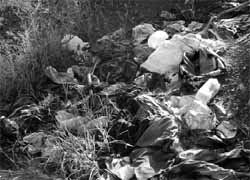Desert Invasion - U.S.Pictures of illegal immigration invasion on the Tohono O'odham Indian NationThe Tohono O'odham Indian Nation lies southwest of Tucson, Arizona, adjacent to Organ Pipe National Monument. For cultural and religious reasons, the Nation allows few pictures to be taken on it's land. Nevertheless, this area is being devastated by the consequences of illegal immigration and drug runners.
Report on the Tohono O'odham Indian NationThe following excerpts are from the report BORDER SECURITY - Agencies Need to Better Coordinate Their Strategies and Operations on Federal Lands, U.S. Government Accounting Office, June, 2004: More than 100,000 pounds of marijuana, 144 grams of cocaine, and 6,600 grams of methamphetamine were seized on the Tohono O’odham Nation in 2003, according to its police department; whereas in the previous year, more than 65,000 pounds of narcotics were confiscated. Illegal border activity on federal lands not only threatens people, but endangered species and the land, itself. Illegal aliens and smugglers have created hundreds of new trails and roads while crossing borderlands,... and in doing so have destroyed cactus and other sensitive vegetation that can take decades to recover, including habitat for endangered species, according to a report on the impacts of undocumented aliens crossing federal lands. These roads and trails disturb wildlife, cause soil compaction and erosion, and can impact stream bank stability. According to the report, vehicles abandoned by smugglers are routinely found on federal lands and are not only expensive to remove, but towing them from remote areas can result in additional resource damage... Tons of trash and human waste are left behind each year, affecting wildlife, vegetation, and water quality. According to the Tohono O’odham Nation, located along Arizona’s Mexican border, illegal border crossers left behind close to 4,500 abandoned vehicles in fiscal year 2002 and an estimated 4 million pounds of trash each year as they crossed over the lands... According to the Tohono O’odham Nation Police Department, it removed over 7,000 such vehicles in 2003. One land management official described another federal property on Arizona’s border as so unsafe and with resources so destroyed that it is now primarily used for illegal activities and no longer visited by the legal public. Finally, illegal border activity is affecting federal lands beyond those immediately along the border and creating law enforcement challenges there. For example, a Bureau of Land Management property we visited in Arizona, Ironwood Forest National Monument, sits more than 60 miles north of the Mexican border, adjacent to the northeast boundary of the Tohono O’odham Indian Reservation, yet Bureau officials told us it shares many of the border-related problems of federal lands right on the border... Bureau officials told us that as a result of one officer being nearly run over by illegal aliens in vehicles, as well as other assaults on officers, the Bureau requires that officers travel in patrol teams (two vehicles) to help ensure their safety. The monument’s vulnerable ecosystem, with over 600 animal and plant species—some of them endangered—has been damaged by illegal border traffic. According to Bureau officials, smugglers and other illegal aliens in route from Mexico have established more than 50 illegal roads through the monument that damage plants. In addition, the illegal aliens and smugglers have abandoned about 600 vehicles each year and leave behind waste that creates biohazards. Regarding tribal lands, the Tohono O’odham Nation Police Department estimated it spent about $3.4 million in fiscal year 2003 on activities directly related to illegal border activity on its land. This included processing drug smuggling cases, towing stolen vehicle abandoned by smugglers, investigating deaths and homicides, and conducting autopsies. According to Tohono O’odham officials, the Nation wants to recoup these costs, either through direct funding to the Nation, or through responsible law enforcement agencies. The administration’s fiscal year 2005 budget includes $1.4 million specifically for law enforcement for the Tohono O’odham Nation. According to Bureau of Indian Affairs officials, this amount will not cover the annual cost of addressing the Nation’s border-related problems.
|

